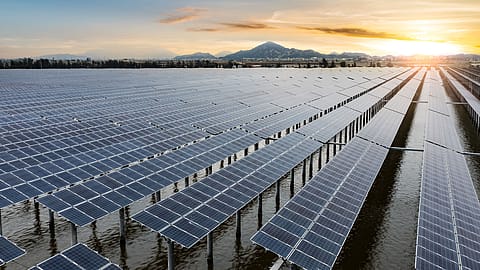Solar firms face over 2,700 compliance requirements despite policy support, new report says
The report observes that key compliance complexities include regulatory fragmentation across jurisdictions, overlapping mandates from different authorities, inconsistent policy implementation, slow land acquisition, and environmental clearance processes.

For a standalone solar company with its corporate office in Haryana and a solar energy production plant in Maharashtra, how many compliances and permissions are required to start and run the business? Despite the liberal policies and regulatory support in renewable energy, compliance requirements are numerous.
Regulatory specialist TeamLease Regtech studied such a scenario and produced a report titled “Renewable Energy Compliance & Regulatory Landscape in India.” The report says that the company must fulfil 799 unique and 2,735 total obligations throughout its operations. The manufacturing plant requires 51 approvals, permissions, and registrations and must comply with 285 legal mandates across categories like safety, employee welfare, and audits. The corporate office must adhere to 514 compliances, of which 83 carry imprisonment clauses, often for procedural lapses.
The regulatory framework spans central, state, and local levels, involving bodies such as the Central Electricity Regulatory Commission (CERC), State Electricity Regulatory Commissions (SERCs), and Bureau of Energy Efficiency (BEE). Compliance requirements include adherence to Renewable Purchase Obligations (RPOs), the Energy Conservation Act, 2001, tariff policies, environmental clearances, and grid integration standards as per the Central Pollution Control Board (CPCB) norms.
Every solar energy producing plant must obtain 51 certificates, licenses, permissions, and approvals under at least 31 acts and rules at various stages of business from Central and State authorities for setting up the plant. Further, seven pre-commissioning and 10 post-commissioning approvals are required to run the plant, besides 30 more ongoing permissions to run the plant.
Over 37% of these 51 approvals are in the general category — like NOC from the Airport Authority on height clearance, permission to erect a lift or escalator, motor vehicle and Vehicle Registration Certificate, excise clearance to use spirit, etc. However, the complexities do not end there. These registrations, licenses, permissions, etc., all have different timelines for their approval, varying from a week to over three months. This affects the company’s business planning and operations, as some approvals take much longer than others, observes the report.
Further, compliances at central (648), state (151), and municipal (2) levels for a solar energy producing plant are about 799. However, this figure inflates to 2,735 once factoring in the annual frequency of these obligations. This figure can go even higher given the nature of ongoing and event-based compliances that do not have a fixed frequency.
The report observes that key compliance complexities include regulatory fragmentation across jurisdictions, overlapping mandates from different authorities, inconsistent policy implementation, slow land acquisition, and environmental clearance processes. Additionally, the dynamic regulatory environment, marked by frequent legal updates and continued reliance on manual, paper-based compliance systems, increases the risk of non-compliance.